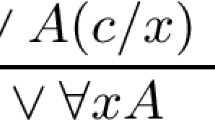Abstract
This paper adds evidence structure to standard models of belief, in the form of families of sets of worlds. We show how these more fine-grained models support natural actions of “evidence management”, ranging from update with external new information to internal rearrangement. We show how this perspective leads to new richer languages for existing neighborhood semantics for modal logic. Our main results are relative completeness theorems for the resulting dynamic logic of evidence.
Similar content being viewed by others
References
Andreka Hajnal, Mark Ryan, Pierre Yves Schobbens: ‘Operators and laws for combining preference relations’. Journal of Logic and Computation 12(1), 13–53 (2002)
Baltag, A., and S. Smets, ‘Conditional doxastic models: A qualitative approach to dynamic belief revision’, in G. Mints, and R. de Queiroz, (eds.), Proceedings of WOLLIC 2006, LNCS, vol. 165, 2006, pp. 5–21.
Boutilier, Craig, Conditional Logics for Default Reasoning and Belief Revision, Ph.D. thesis, University of Toronto, 1992.
Chellas, Brian, Modal Logic: An Introduction, Cambridge University Press, 1980.
Demey, Lorenz, Agreeing to Disagree in Probabilistic Dynamic Epistemic Logic., Master’s thesis, ILLC University of Amsterdam (LDC 2010-14), 2010.
Dempster A.P.: ‘Upper and lower probabilities induced by a multivalued mapping’. Annals of Mathematical Statistics 38(2), 325–339 (1967)
Gärdenfors, Peter, Knowledge in Flux: Modeling the Dynamics of Epistemic States, Bradford Books, MIT Press, 1988
Girard, Patrick, Modal Logic for Belief and Preference Change, Ph.D. thesis, ILLC University of Amsterdam Dissertation Series DS-2008-04, 2008.
Halpern Joe, Ricardo Pucella: ‘A logic for reasoning about evidence’. Journal of AI Research 26(1), 1–34 (2006)
Hansen Helle Hvid, Clemens Kupke, Eric Pacuit: ‘Neighbourhood structures: Bisimilarity and basic model theory’. Logical Methods in Computer Science 5(2), 1–38 (2009)
Hansson, Sven Ove, A Textbook of Belief Dynamics. Theory Change and Database Updating, Kluwer, 1999.
Kratzer Angelika: ‘What must and can must and can mean’. Linguistics and Philosophy 1, 337–355 (1977)
Leitgeb Hannes, Krister Segerberg: ‘Dynamic doxastic logic: why, how and where to?’. Synthese 155(2), 167–190 (2007)
Lewis David: Counterfactuals. Blackwell Publishers, Oxford (1973)
Liu, Fenrong, Reasoning about Preference Dynamics, vol. 354 of Synthese Library, Springer-Verlag, 2008.
Liu, Fenrong, ‘A two-level perspective on preference’, Journal of Philosophical Logic, 2011. To Appear.
Moss, Larry, and Rohit Parikh, ‘Topological reasoning and the logic of knowledge’, in Yoram Moses, (ed.), Proceedings of TARK IV, Morgan Kaufmann, 1992.
Pacuit, Eric, ‘Neighborhood semantics for modal logic: An introduction’, 2007. ESSLLI 2007 course notes (ai.stanford.edu/~epacuit/classes/).
Pauly, Marc, Logic for Social Software, Ph.D. thesis, ILLC University of Amsterdam Dissertation Series DS 2001-10, 2001.
Plaza J.: ‘Logics of public communications’. Synthese: Knowledge, Rationality, and Action 158(2), 165–179 (2007)
Rott, Hans, Change, Choice and Inference: A Study in Belief Revision and Nonmonotonic Reasoning, Oxford University Press, 2001.
Rott, Hans, ‘Shifting priorities: Simple representations for 27 iterated theory change operators’, in H. Lagerlund, S. Lindström, and R. Sliwinski, (eds.), Modality Matters: Twenty-Five Essays in Honor of Krister Segerberg, vol. 53 of Uppsala Philosophical Studies, 2006, pp. 359–384.
Segerberg Krister: ‘Belief revision from the point of view of doxastic logic’. Journal of the IGPL 3(4), 535–553 (1995)
Shafer, Glen, A Mathematical Theory of Evidence, Princeton University Press, 1976.
Shoham, Yoav, and Kevin Leyton-Brown, Multiagent Systems: Algorithmic, Game-Theoretic, and Logical Foundations, Cambridge University Press, 2009.
Stalnaker Robert: ‘Knowledge, belief and counterfactual reasoning in games’. Economics and Philosophy 12(02), 133–163 (1996)
Su, Kaile, Abdul Sattar, Guido Governatori, and Qingliang Chen, ‘A computationally grounded logic of knowledge, belief and certainty’, in Proceedings of the fourth international joint conference on autonomous agents and multiagent systems, AAMAS ’05, 2005, pp. 149–156.
van Benthem Johan: ‘Dynamic logic for belief revision’. Journal of Applied Non-Classical Logics 14(2), 129–155 (2004)
van Benthem, Johan, ‘A note on modeling theories’, in R. Festa, A. Aliseda, and J. Peijnenburg, (eds.), Poznan Studies in the Philosophy of the Sciences and Humanities: Confirmation, Empirical Progress and Truth Approximation. Essays in Debate with Theo Kuipers, vol. 17, 2005, pp. 403–419.
van Benthem Johan: ‘Merging observation and access in dynamic logic’. Studies in Logic 1(1), 1–17 (2008)
van Benthem, Johan, Logical Dynamics of Information Flow, Cambridge University Press, 2011.
van Benthem, Johan, and Stefan Minica, ‘Toward a dynamic logic of questions’, in Xiangdong He, John F. Horty, and Eric Pacuit, (eds.), Logic, Rationality, and Interaction, vol. 5834 of LNCS, Springer, 2009, pp. 27–41.
van Benthem, Johan, and Eric Pacuit, ‘Dynamic logics of evidence-based belief’, Tech. rep., Institute for Logic, Language and Computation, 2011.
van Benthem Johan, Fernando Raymundo Velázquez-Quesada: ‘The dynamics of awareness’. Synthese 177, 5–27 (2010)
van Ditmarsch, H., W. van der Hoek, and B. Kooi, Dynamic Epistemic Logic, Synthese Library, Springer, 2007
Velazquez-Quesada F.R.: ‘Inference and update’. Synthese (Knowledge, Rationality and Action) 169(2), 283–300 (2009)
Veltman, Frank, ‘Prejudices, presuppositions and the theory of conditionals’, in Jeroen Groenendijk, and Martin Stokhof, (eds.), Amsterdam Papers in Formal Grammar, vol. 1, 1976, pp. 248–281.
Zvesper, Jonathan, Playing with Information, Ph.D. thesis, ILLC University of Amsterdam Dissertation Series DS-2010-02, 2010.
Author information
Authors and Affiliations
Corresponding author
Additional information
Dedicated to Professor Ryszard Wójcicki on the occasion of his 80th birthday
Ryszard has been an inspirational leader in logical research and a major force in the organization of the field for decades. His influence is felt in many circles in many countries. It is an honour to contribute to this special issue of Studia Logica our article to him.
Special issue in honor of Ryszard Wójcicki on the occasion of his 80th birthday
Edited by J. Czelakowski, W. Dziobiak, and J. Malinowski
Rights and permissions
About this article
Cite this article
van Benthem, J., Pacuit, E. Dynamic Logics of Evidence-Based Beliefs. Stud Logica 99, 61 (2011). https://doi.org/10.1007/s11225-011-9347-x
Received:
Accepted:
Published:
DOI: https://doi.org/10.1007/s11225-011-9347-x




